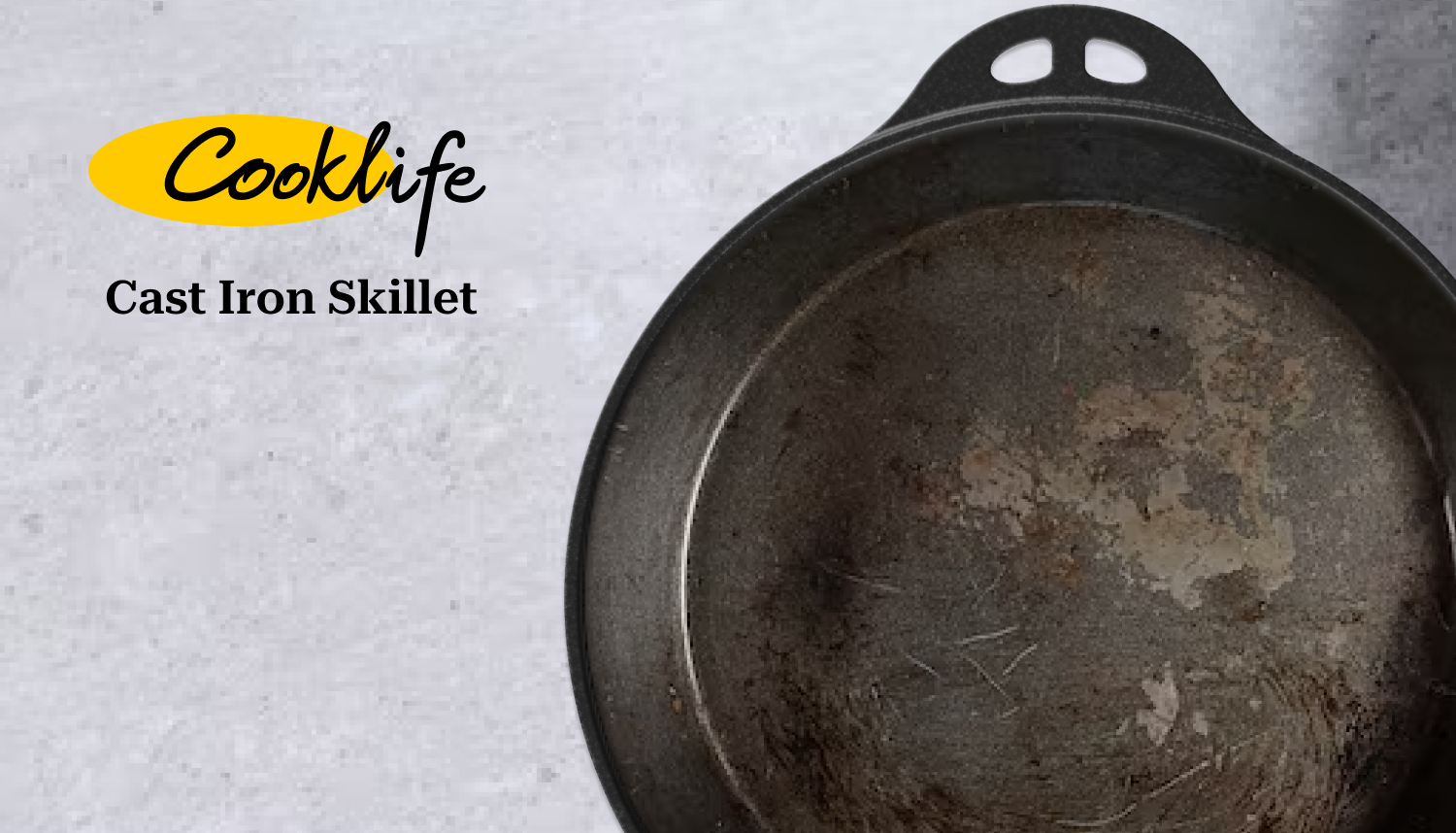Rust
The Cause:
Cast iron cookware can develop rust when exposed to moisture for extended periods of time. However, rusting does not make it harmful in any way. If you leave your cast iron cookware in the sink to soak, put it in the dishwasher or let it air dry, it will rust. Moisture-prone environments such as a cabinet near a dishwasher, an open cabinet in a humid location, or outdoor storage can also cause rusting.
The Fix:
Follow these steps to restore your cast iron skillet.
Step 1.
Scour
To prepare your cast iron cookware for re-seasoning, start by scouring its surface with warm, soapy water and a metal scouring pad. This is perfectly safe since you will be re-seasoning the cookware anyway. Once you are done, rinse it thoroughly and dry it by hand.
Step 2.
Oil
Apply a thin layer of oil inside and outside the cookware. Using too much can cause stickiness.
Step 3.
Bake
To achieve the classic black patina on your cookware, place it upside down on the top rack of your oven. Cover the bottom rack with aluminum foil to catch any excess oil that may drip off the cookware. Bake at 450-500 degrees Fahrenheit for one hour. After baking, allow it to cool before repeating the process as necessary.
Sticking

The Cause:
Sometimes, food can stick to your cast iron cookware. This can occur due to several reasons, including inadequate use of fat or oil during cooking, use of poorly seasoned cookware, or usage of new cookware that hasn't developed extra layers of seasoning yet.
The Fix:
To prevent food from sticking to your skillet, add a teaspoon of oil before cooking and heat it gradually on the stovetop or in the oven. Once you're done cooking, let the cookware cool down and remove any stuck-on food using a pan scraper. Then, scrub the skillet with a nylon brush or non-scratch pad, dry it by hand, and apply a generous layer of oil. Make sure to rub the oil evenly onto the pan.
Flaking
The Cause:
Black specks may appear on a pan when the seasoning breaks down, but it is harmless and can be avoided with proper seasoning.
The Fix:
To prepare your cookware, gently scrub off any loose flakes, then season it by applying a thin layer of oil and rubbing it all over the pan. Preheat the oven to 450-500 degrees F. Place the cookware upside down on the middle rack of the oven and bake for one hour. Make sure to line the bottom rack with aluminum foil to catch any excess oil. With each seasoning, the flakes will decrease until they are minimal.
Black Residue
The Cause:
It is possible for some seasoning residue to come off your seasoned cookware. This residue is not harmful and will gradually decrease over time as you use the cookware more frequently. You may also notice it when cooking liquids or boiling water, using soap on newer cookware, or cooking acidic and alkaline foods like beans and tomatoes.
The Fix:
By continuing to use and maintain your cookware, the black residue will gradually decrease as the seasoning improves.
Sticky Surface
The Cause:
If your pan is sticky, it may have excess oil.
The Fix:
To eliminate stickiness, place the cookware upside down on the top rack of the oven and bake at 450-500 degrees Fahrenheit for an hour. Afterward, allow the cookware to cool and repeat the process if necessary.
Odors
The Cause:
You may notice lingering smells when cooking fish or spicy foods in cast iron or not cleaning cookware before storing.
The Fix:
If you want to get rid of any unpleasant odor from your cast iron pan, you can simply bake it in the oven at 400 degrees Fahrenheit for 15 minutes. This easy technique will not only help to eliminate the odor, but also protect the seasoning on your cookware. Alternatively, you can sprinkle a layer of regular table salt on the cooking surface of your cookware and leave it on overnight. Rinse it off in the morning and the odor will be gone. If the unpleasant smell still lingers, then you may have to scour and re-season your cookware.

